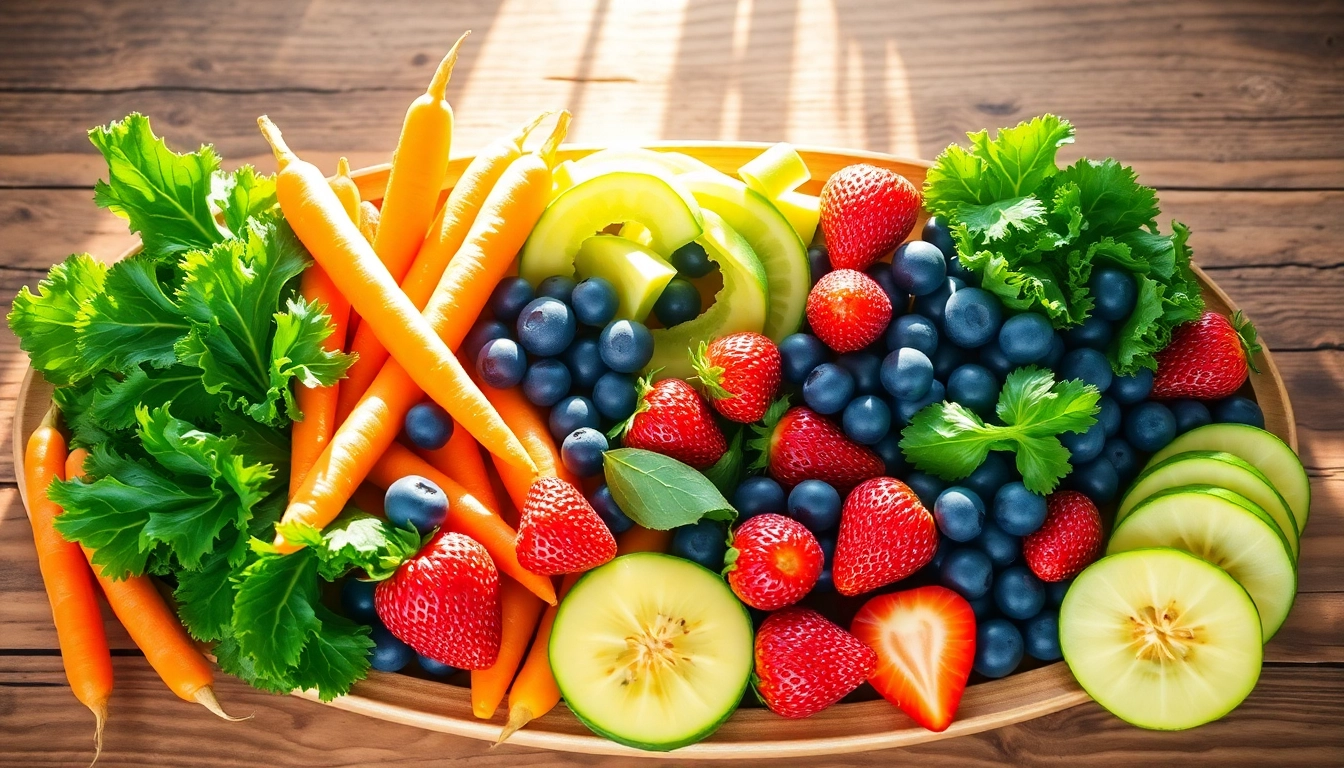Essential Healthy Food: 10 Proven Choices for an Energized Life

Understanding Healthy Food: The Foundation of Nutrition
In today’s health-conscious world, Healthy Food has become a buzzword that evokes images of leafy greens, wholesome grains, and vibrant fruits. However, understanding what constitutes healthy food and the reasons why it is pivotal for our well-being can pave the way for more nutritious eating habits. This article will delve deeply into the concept of healthy food, its benefits, and strategies to incorporate it into our daily lives.
What is Healthy Food?
Healthy food can be defined as any food that contributes positively to our health and well-being. This includes a wide variety of nutrient-dense options, ranging from fruits and vegetables to whole grains, lean proteins, and healthy fats. The key attributes of healthy foods include:
- Nutrient Density: Foods rich in vitamins, minerals, and other essential nutrients relative to their calorie content.
- Unprocessed or Minimally Processed: Whole foods that are not heavily processed or laden with additives.
- Balanced Macros: A good mix of carbohydrates, proteins, and fats that work cohesively to support bodily functions.
Examples of healthy foods include leafy greens like kale and spinach, fruits such as berries and apples, whole grains like quinoa and oats, nuts, seeds, and lean sources of protein. Understanding this foundational concept is crucial as it forms the basis for composing a healthy diet.
Benefits of Incorporating Healthy Food in Your Diet
The advantages of making healthy food choices are extensive and can profoundly influence our overall health. Key benefits include:
- Weight Management: Healthy foods tend to be lower in calories and higher in fiber, which can help regulate appetite and promote a healthy weight.
- Improved Mood and Cognitive Function: Diets rich in whole, unprocessed foods have been associated with better mental health outcomes.
- Lower Risk of Chronic Diseases: A diet high in fruits, vegetables, and healthy fats can reduce the risk of diseases such as diabetes, heart disease, and cancer.
- Enhanced Energy Levels: Proper nutrition fuels the body and can lead to increased energy levels throughout the day, improving physical performance and daily productivity.
In summary, incorporating healthy food into daily life is essential for both physical and mental well-being. It’s not just about avoiding unhealthy options but actively selecting foods that support long-term health.
Common Misconceptions About Healthy Food
Despite the overwhelming evidence supporting the benefits of healthy eating, several myths persist. Some common misconceptions include:
- Healthy Food is Expensive: While organic and specialty health foods can carry a premium, many nutritious options like beans, seasonal fruits, and vegetables are quite affordable.
- Eating Healthy is Time-Consuming: With proper planning and meal prep strategies, healthy eating can be quick and efficient.
- You Have to Give Up Your Favorite Foods: Healthy eating is about balance and moderation, allowing for indulgences without compromising overall nutrition.
Addressing these misconceptions is vital for encouraging more people to adopt a healthier lifestyle.
Top Healthy Foods to Include in Your Daily Meals
After clarifying what healthy food is and its benefits, let’s explore the top categories of foods to incorporate into your daily meals to reap the most nutritional benefits.
Fruits and Vegetables You Should Eat
Fruits and vegetables are the cornerstone of a healthy diet. They are rich in vitamins, minerals, fiber, and antioxidants, which collectively contribute to health and wellness. Here are some excellent choices:
- Leafy Greens: Spinach, kale, and Swiss chard are loaded with nutrients while being low in calories.
- Berries: Blueberries, strawberries, and raspberries are high in fiber and antioxidants, which can reduce the risk of chronic diseases.
- Citrus Fruits: Oranges, lemons, and grapefruits are excellent sources of vitamin C, which supports the immune system.
- Cruciferous Vegetables: Broccoli, cauliflower, and Brussels sprouts are known for their cancer-fighting properties.
Incorporating a colorful variety of fruits and vegetables into your diet ensures a broad spectrum of nutrients.
Whole Grains: Why They Matter
Whole grains are nutrient-dense and provide essential fibers, which are beneficial for digestive health. They differ from refined grains, which have been stripped of nutrients. Some wholesome options include:
- Quinoa: A complete protein source that is gluten-free and rich in various nutrients.
- Brown Rice: It is higher in fiber than white rice and can aid in maintaining blood sugar levels.
- Whole Wheat: Opt for whole-wheat bread and pasta, which offer more fiber and nutrients compared to their refined counterparts.
- Oats: They are excellent for breakfast and can help lower cholesterol levels when consumed regularly.
By choosing whole grains over refined grains, individuals can significantly enhance their dietary quality and health outcomes.
Protein Sources: Balancing Your Meals
Protein is crucial for rebuilding tissues, and it is essential to obtain it from a variety of sources. Healthy protein choices include:
- Lean Meat: Chicken, turkey, and fish are excellent sources of high-quality protein.
- Legumes: Beans, lentils, and chickpeas are plant-based proteins that also provide fiber.
- Nuts and Seeds: Almonds, chia seeds, and hemp seeds add healthy fats and protein to meals.
- Dairy or Alternatives: Choose low-fat options or fortified plant-based alternatives for a protein boost.
A balanced intake of protein, coupled with carbohydrates and fats, creates well-rounded meals that support health and promote satiety.
Creative Ways to Prepare Healthy Food
Planning how to prepare your healthy food can make the difference between enjoying your meals or finding them tedious. Let’s explore creative and delicious methods to make healthy eating exciting.
Quick and Easy Healthy Recipes
With a bit of creativity, healthy meals can be both quick and enjoyable. Here are some easy-to-make recipes:
- Veggie Stir-Fry: Sauté a mix of your favorite vegetables with some tofu or chicken and a bit of low-sodium soy sauce for a quick, nutritious meal.
- Overnight Oats: Combine oats with Greek yogurt and fruits in a jar. Let them sit overnight, and you’ll have a nutritious breakfast ready to go.
- Quinoa Salad: Mix cooked quinoa with diced vegetables, beans, and a sprinkle of olive oil and lemon juice for a refreshing meal.
- Grilled Salmon: Marinate salmon with herbs and lemon, and grill it for a healthy source of protein packed with omega-3 fatty acids.
These easy recipes will save time while keeping your meals nutritious and delicious.
Healthy Food Swaps: Make It Delicious
Sometimes, making healthy choices is about swapping out less healthy ingredients for better alternatives. Here are some simple swaps that can drastically improve your diet:
- Greek Yogurt for Sour Cream: Use Greek yogurt in dips and dressings for added protein and fewer calories.
- Zoodles for Pasta: Substitute zucchini noodles for traditional pasta to cut carbs and increase vegetable intake.
- Cauliflower Rice for White Rice: This swap provides fewer calories and more nutrients.
- Almond Milk for Dairy Milk: For those looking to reduce calories or switch to plant-based options, almond milk is a great alternative.
These swaps not only enhance the health aspect of your meals but can also introduce different flavors and textures into your diet.
Meal Prep Ideas to Stay on Track
Meal prepping can be a game changer for maintaining a healthy diet. Here’s how to effectively meal prep for the week:
- Choose Recipes: Select a mix of healthy recipes for breakfast, lunch, and dinner that can be prepared in bulk.
- Plan a Shopping List: Make a complete list of ingredients needed to avoid impulse buys when you shop.
- Allocate Time for Prep: Dedicate a few hours on a weekend to prepare and portion meals for the week ahead.
- Store Properly: Invest in good-quality containers to keep meals fresh and organized in your refrigerator or freezer.
By preparing meals in advance, it becomes easier to make healthy eating choices even on the busiest days.
Challenges in Maintaining a Healthy Food Diet
Despite the clear benefits of a healthy diet, many experience challenges that can hinder their ability to eat well consistently. This section addresses common obstacles and provides strategies to overcome them.
Overcoming Common Obstacles
Some common challenges include lack of time, temptation from unhealthy food options, and not knowing how to prepare healthy meals. Strategies to overcome these include:
- Budget Your Time: Schedule specific times for meal preparation and grocery shopping just as you would any other important appointment.
- Keep Healthy Snacks Accessible: Prepare and keep healthy snacks like fruits, nuts, and yogurt readily available to avoid the temptation of junk food.
- Educate Yourself: Learning healthy cooking techniques and nutrition can empower you to make better choices.
Developing a proactive approach to challenges can significantly improve your adherence to a healthy eating plan.
Staying Motivated and Committed
Staying committed to healthy eating can be difficult, but setting realistic goals and tracking your progress can help. Here are some tips:
- Set Achievable Goals: Instead of aiming for perfection, set small, manageable goals to track your improvements.
- Find a Buddy: Partner with a friend or family member to keep each other accountable and motivated.
- Keep a Food Diary: Documenting what you eat can help you identify patterns and motivate you to stay on track.
By regularly reminding yourself of the benefits of healthy eating and celebrating small victories, you can maintain your dedication.
How to Handle Social Situations
Social gatherings can present challenges when trying to maintain healthy eating habits. Here’s how to navigate these situations:
- Survey the Options: Check out the available food choices before diving in to help you make better selections.
- Bring a Dish: Contributing a healthy dish ensures there will be at least one nutritious option available.
- Practice Mindful Eating: Pay attention to your hunger cues and eat slowly to enjoy your meal while preventing overeating.
Handling social situations with confidence can promote healthier eating habits without detracting from your enjoyment of the event.
Measuring the Impact of Healthy Food on Your Well-being
The benefits of healthy food choices can be profound, but they are best measured by understanding specific metrics surrounding nutrition and personal health. Here are several ways to assess the impact of diet on well-being:
Understanding Nutrition Labels
Nutrition labels are vital tools for evaluating food products. Familiarize yourself with reading labels to make informed choices:
- Serving Size: Understand the serving size to gauge how many calories and nutrients you’ll consume.
- Ingredients List: Avoid products with long lists of ingredients, especially those containing additives and preservatives.
- Nutrient Breakdown: Focus on foods that are high in fiber, vitamins, and healthy fats while being low in saturated fats, sugars, and sodium.
Being proficient in deciphering nutrition labels empowers consumers to make better food choices in the supermarket.
Tracking Your Progress
Measuring progress is crucial to understanding the impact of healthy eating habits on your life. Consider these methods:
- UseApps and Journals: Tracking nutrition progress through apps or journals can provide insights into your eating patterns.
- Monitor Physical Changes: Take note of physical changes such as energy levels, mood improvement, or bodily changes like weight loss or gain.
- Regular Health Check-ups: Check with healthcare providers where lab tests can help measure cholesterol, blood sugar, and other health markers.
Regular tracking allows for adjustments to be made as needed and can keep individuals on track toward their health goals.
Consulting with Nutrition Experts
For personalized guidance, consulting with nutritionists or dietitians can be beneficial. They can assist with:
- Personalized Meal Plans: Creating tailored meal plans based on individual dietary restrictions and goals.
- Education: Providing education on nutrition, assisting with food choices, and dispelling myths around food.
- Accountability: Regular check-ins can help maintain motivation and commitment to health goals.
Professional guidance can enhance understanding and implementation of healthy eating practices, especially for those unsure where to begin.






